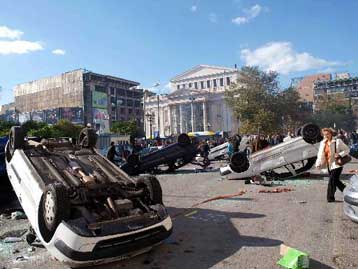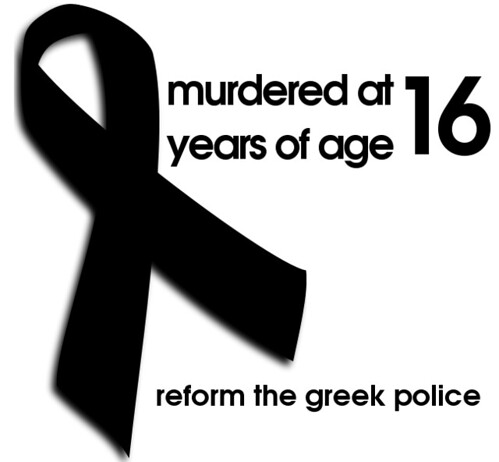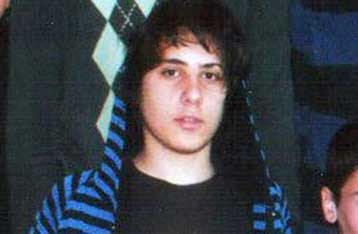The riots
/ the fire of youth /
By all accounts Alexis Grigoropoulos was an unlikely martyr. A "good kid", top student and nice with friends, he was born into relative upper middle class privilege and wealth. He attended good private schools. His mother and father were successful professionals. He didn't hang out in Exarchia regularly, and all his friends agree that he wasn't some sort of anarchist. A progressive kid, sure, but not someone who habitually clashes with the police.
He seems to have been, however, in the wrong place, the wrong time and he didn't realize the "cops" who are patrolling Exarchia, meant deadly business - more like rival gang members than cops. This was about to cost him his life and produce the most violent extensive and persistant rioting the country has ever seen in peacetime, since the Polytechnic uprising against the Junta in 1973.

[by: murplejane]
So it started: like something seen ten times daily in the neighborhood. The "anarchist heartland" of Athens, the Mecca of local protest. A no-go area for the police, supposedly, despite the fact that the neighbourhood has been frequently overrun by the authorities. It is a weird kind of lawlessness: it was, and probably still is, the safest neighborhood say, for a woman to walk alone at night (in a generally safe city, comparatively speaking).
Because of the frequent skirmishes with various anarchist and anti-authoritarian groups (understand that the majority aren't Wobbly activists, nor Kropotkin scholars - they are mostly teenagers with a very broad and possibly slanted idea of what anarchism is: they don't like cops mostly) the cops send the "worst" kind of police: untrained ramboid "special guards".
Two of those Special Guards were on patrol Saturday night. Witnesses state that they were jeered when passing by Exarchia square by a group of kids. Water-bottles were possibly thrown at the patrol car. The two officers left, they parked their car a couple of blocks away, they notified a squad of riot police that were in the area, and they proceeded to the square. There they start threatening and swearing at the group of kids - quite possibly (though this is still murky AFAIK) a different or larger group of kids - from a distance of possibly twenty meters. The kids swear back. It's like a street quarrel, only one side is armed and dangerous. No side moves towards the other. There are dozens of witnesses to all of this because the area is packed with cafes and shops. The police officer by all eyewitness accounts raises his gun, aims and shoots at a figure from the other side. he shoots at Alexandros Grigoropoulos, 15, not an "Exarchia regular", who dropped by that day to meet some friends. The bullet hits the kid in the heart. He drops. Friends think he slipped and try to pick him up. They realize he's dead. The news spreads like wildfire.
I reported the following in a comment here, on December 7th:
It's difficult to describe, because it is unfolding right now even, but we're seeing large-scale, uncontrollable riots here, going on for a second night. Although there is a long history of anarchist and autonomist actions and (mostly) reactions, bordering often on a cowboy-and-indian style ritualized confrontation with the cops, last night (and today and tonight), the rioting was unprecedented in participation, in speed of reaction and in geographical extent. As I write this parts of Athens are burning, main University buildings are occupied by students, and looting has started. Most shops in Athens' main commercial boulevard, Ermou Str. have been burnt or smashed, and riots are ongoing in the country's second largest city, Thessaloniki, as well as Patras, Ioannina, Mytilene, Iraklion ,Chania, Agrinio, almost every town larger than 20k people it seems. From what I understood from the description of the Paris riots three years ago, this is pretty close in terms of the extent of damage inflicted on the city.
The trigger was the murder of the 16 year old kid in Exarchia, the alternative/atiauthoritarian hotbed of Athens, in what eyewitnesses describe as a shooting in cold blood by a Special Guard (like a policeman only less trained and more eager to shoot as not a few recent incidents have shown). But the tension that has created the possibilities of riots has been brewing for some time now, certainly since last year's student protests, when the police started a de facto feud with anyone under 30. And it isn't just the youth. The police were pelted with lemons thrown by apartment residents of all ages from their balkonies, I heard, as they were passing through Alexandras Ave and the composition of the crowd yesterday (2500 three hours after the event at midnight, of all ages), included some not so young faces.
There is a climate of utter disappointment with the government (and the political system as a whole I'd say), coupled with the grimmest mood I can remember, insecurity, high unemployment, high cost of living along with low paying and precarious work especially for young people - plus of course the ominous shadow of the Crisis.
IOW, in terms of societal weather: its rioty with a good chance of local revolts.
Rioty indeed. Even tonight the heat is still on and it seems like its not abating. Fires are still burning. There were up till a short while ago possibly 1000 people barricaded inside the Polytechnic schools. Looters were near lynched in down-town Athens. Neonazis "assisted" shopowners against the rioters in the port city of Patras.
Since Saturday there seems to have been few towns in Greece without some sort of disturbance: In the usually pacific island of Chios there was a demonstration of 1000 people. Protests were reported in the staunchly conservative town of Gytheio in the SOuthern Peloponnese. Down-town Thessaloniki is burning since Saturday.
Monday was the day the schools sprang into action. Pissed off but cheery, mourning but laughing, they flooded town and city senters. In Athens a humongous demonstration poured in from the more or less affluent Northern and Southern Suburbs, from the working class Western Suburbs, from the city's downtown semi-ghettos, from everywhere in Attiki. They marched to besiege Attiki Police Headquarters. There, students hurled stones and invective against the guards. At some point three students moved towards the building, stripped and fell on the steps of the Police HQ, as corpses:
In Pireus (Athens' port), students turned the square where the local police is headquartered into a... well a rather original work of conceptual art, but flipping over all civilian police vehicles:
 |
Moving stuff, that had even conservative commentators "understanding" the students' rage. But the violence kept coming and it wasn't just clashes with the police, or against ministries and banks (I noticed that no one minded when banks were burned: everybody seems to love a burning bank these days). Monday night along with massive, and strong demonstrations of the parties of the left, small anarchist groups spread chaos by breaking shop windows, burning and/or looting shops of all sizes. This was a first and an indication that this wasn't your run of the mill anarchists who had up till now the political sense not to antagonize small business owners by destroying them. The looting spread. In Pireus' Str and Patission str. near the Polytechnic, rather poor commercial areas, looters that had nothing to do with the demonstrations rampaged through the broken shops, large and small. A certain part of the young demonstrators from all over the suburbs (local and immigrant) came to the demonstration singing football chants and ready for a different type of action. The poor and the marginalized in the city's center saw this as an opportunity. With cops overwhelmed and unprepared for anything of this scale (no longer 50-100 "anarchists" - they were facing over a thousand people going berserk, drunk on the joy of destruction) the ability of the police to intervene collapsed. It was a free-for-all of looting in the city center. The same more or less for the country's biggest cities - and beyond Greek students occupied the Greek embassy in Berlin for a while, demonstrations of Greek students happened outside the embassies in London, paris and Madrid (I think). The state seemed to collapse.
As Athens' huge Christmas tree was burning early Tuesday morning, along with tens of cars, there was certainly no joyful festive mood.
Today, events started slow. Students had the day off (officially: the ministry of education declared the day a holiday). The teachers demo was pretty much uneventful. Minor skirmishes down-town were tame enough for spectators to gather around them. The funeral of Alexis was respectful, silent, grieving and massive. Then the police units near the funeral started displays of strength. There were pistol shots fired by the police's motorcycle squad members. Violence broke out nearby. Then as the day ran out the riots continued, all over Greece again. A friend who was checking out the situation from up close described the people on the street breaking stuff as "undercover police, common law criminals and assorted bums" (but yet another as "the true face of modern disadvantaged proletarian youth bereft of any political ambition whatsoever). These are people a lot of anarchists even, are pissed off with.
There is, I repeat, no obvious end in sight. The government is at a loss. The police is demoralized, pissed-off, incompetent and dangerous at the same time. Will the riots fizzle off? Will the students back down? I don't think so, though there is an obvious difference in intent and consequences between the organized students (and not just schools - the universities have also joined the demonstrations and the hullabaloo) and the shop-window smashers (though the intersection of these two sets is certainly not null). Will the latter give up?
Tomorrow the unions in both public and private sectors have called for a general strike (planned before the riots started) protesting against the government's economic policies (in short 28 billion Euro bail-out for the bankers - who haven't even offered proof that they need it - versus half a billion for the cohesion/anti-poverty fund - less than half of what was promised last year). The mix might be very dangerous. The papers are suggesting that if the riots continue past Thursday the government is considering enacting "special measures". Meanwhile the fascists are already in the streets mingling with infuriated shop-owners, building their base for the next decade possibly. The Conservative government has also the suicide option of quitting - but it seems unlikely that it would voluntarily do so since they are trailing in the polls by as many as 7 points behind the Socialists, despite a total Green/Left vote that surpasses the 20% mark.

Lastly, let me sum up the reasons that have converged to bring this enormous riot to a start: ubiquitous police brutality against youth, immigrants, the weak - brutality that routinely goes unpunished as it is swept under the rug; deep systemic corruption and perception of corruption; increasing income gaps; entry level monthly wages in specialized jobs < 700 euro that don't visibly lead to something better; precarity for the under 35s; a life-suppressing yet utterly ineffective educational system; the death of hope; the break-up of existing social patterns; the decay of public services; a justice system plagued with scandal itself; massive bailouts for the bankers - the same bankers who simply refuse to enact laws that they don't like (no, really). And on top of that the Crisis promising even more immiseration and discomfort... Now that I look at the list, the question really is: why didn't this explosion happen sooner?
[cross-posted in the
European Tribune]




